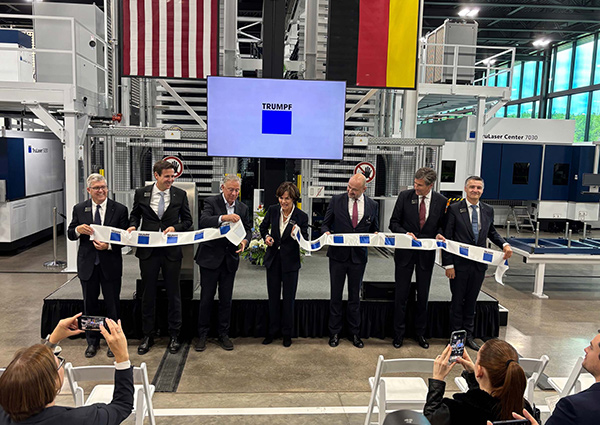Volume 28 | Issue 3
Click here to read the complete illustrated article or continue below to read the text article.
By John Bourdeaux President & CEO, Advance Connecticut
It’s no secret that manufacturing is experiencing significant growth in the U.S. market, and Connecticut is witnessing its fair share of this growth, particularly in areas such as precision and advanced manufacturing. Since 2020, Connecticut has seen a boom in foreign direct investment, which has been supplemented by an increase in Connecticut companies exporting their goods and services, creating a bull market in the state’s manufacturing sector.
In the past five years, Connecticut has welcomed Hanwha Aerospace’s new global headquarters for its International Engine Business division, an expansion by MTU Aero Engines with plans for future growth, a significant expansion by defense tech company TTM Technologies, and a historic hiring spree and expansion — to the tune of more than 10,000 new jobs and $1 billion in investments — by submarine maker General Dynamics Electric Boat.
The state’s latest news was the September 3rd announcement of the expansion of GKN Aerospace, which brings a new additive manufacturing process from Sweden to the U.S., specifically to Newington, Connecticut. GKN Aerospace is shifting production for its groundbreaking, 3D-printed jet engine component with their Connecticut operations supporting full serial production by the end of 2025 and the expanded additive operations expected to begin in 2027.
While a large percentage of growth is taking place in Connecticut’s strong aerospace and defense sector, precision manufacturing of machines and components that require complex engineering and production is equally driving Connecticut’s growth surge. There is a strong demand in this field for technological automation that fills gaps in the workforce, increases efficiency, and continues to improve the perfection of critical manufactured parts and components. While those looking backwards decry the introduction of automation, forward-looking economies like Connecticut’s embrace it as a value and wealth creator for our citizens. We have seen our talented workforce move even higher in the value chain, as they utilize new equipment and processes to achieve these goals. There are few better examples of this than the new Smart Factory built by industrial laser and machine tool manufacturer TRUMPF at its North American headquarters in Farmington, Connecticut.

The state-of-the-art Smart Factory facility attracts thousands of manufacturers from across the United States, Canada and Mexico each year to visit TRUMPF and gain insights into how to streamline and enhance their own production operations. TRUMPF’s bright and modern 55,800 square foot Smart Factory is a result of a recent $40 million investment by the company and part of its “local-for-local” production strategy to reduce lead times and strengthen supply chain resilience. The Smart Factory expands TRUMPF’s capabilities in producing innovative, connected machine tools while showcasing real-life applications of advanced manufacturing technology, automation and data-driven production to its customers. And as Connecticut continues to elevate its position in the high-tech manufacturing sector, initiatives like TRUMPF’s expanded training and apprenticeship programs will be critical in addressing workforce shortages and maintaining competitiveness on a global scale. These strategic investments strengthen TRUMPF’s local manufacturing operations and bolster Connecticut’s reputation as a hub for innovation and advanced manufacturing.
“Connecticut is uniquely placed in the national manufacturing ecosystem,” said Daniel O’Keefe, Commissioner of the Connecticut Department of Economic and Community Development. “If something is complicated, if something is highly engineered and requires immense skill to execute, then companies manufacture that part or system in Connecticut.”
“We are known for operating at the highest end of the manufacturing food chain, and as a result, there is demand for our workforce, our know-how, and the manufacturing culture we have cultivated here for the past two hundred years.”
Analysts who suggest manufacturing is on the decline in the U.S. are not seeing what Connecticut is seeing: there is energy, growth, innovation, re-shoring, and excitement around high-tech precision manufacturing in our state, and we expect this momentum to continue for more than a decade.
Looking at AdvanceCT’s pipeline of new corporate investment and expansions, the companies we work with are bullish about the growth of their businesses as well. Tariff uncertainty has stalled some greenfield foreign investment, but we continue to see companies investing now to prepare for current demand and projected future growth. They understand that the next-generation advancements in precision manufacturing exist now in Connecticut, and they are betting on the future they can see right in front of them.

John Bourdeaux is an experienced leader with a track record of success in marketing and development, strategic planning, professional fundraising, and market research. Prior to joining AdvanceCT, he served as the Vice President of Advancement for the Connecticut Science Center, an organization dedicated to scientific exploration, teacher development, and educational transformation. At AdvanceCT, John’s focus is on operations, member development, and strategic initiatives. John brings valuable nonprofit stakeholder engagement experience to AdvanceCT.
Prior to his work at the Connecticut Science Center, John served as the Director of Development for Hartford Stage and worked for the Melville Charitable Trust and the Partnership for Strong Communities, organizations focused on homelessness and affordable housing policy.
He has served in the development offices of the University of Chicago, The Hotchkiss School, and Yale University. In each of these positions, he was responsible for securing tens of millions in philanthropic support while promoting the mission of each organization, bringing many new supporters and advocates into the fold.
Early in his career, John founded and managed his own not-for-profit theater company in Chicago, IL, producing modern American drama and late-night improvisational comedy. He has also served as a consultant and board member for academic institutions as well as social action and arts organizations. John is a graduate of The Hotchkiss School and the University of Chicago.
Scott Ellyson, CEO of East West Manufacturing, brings decades of global manufacturing and supply chain leadership to the conversation. In this episode, he shares practical insights on scaling operations, navigating complexity, and building resilient manufacturing networks in an increasingly connected world.